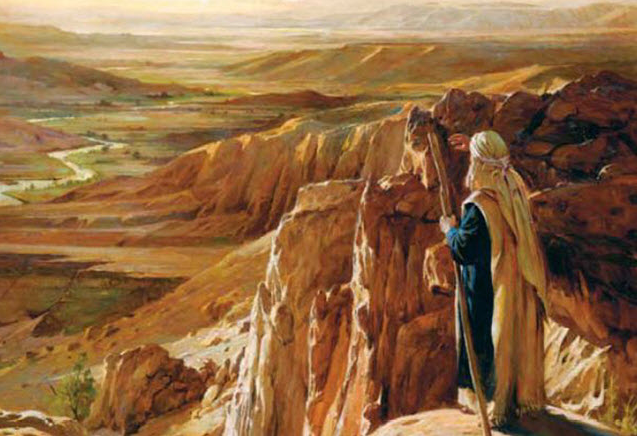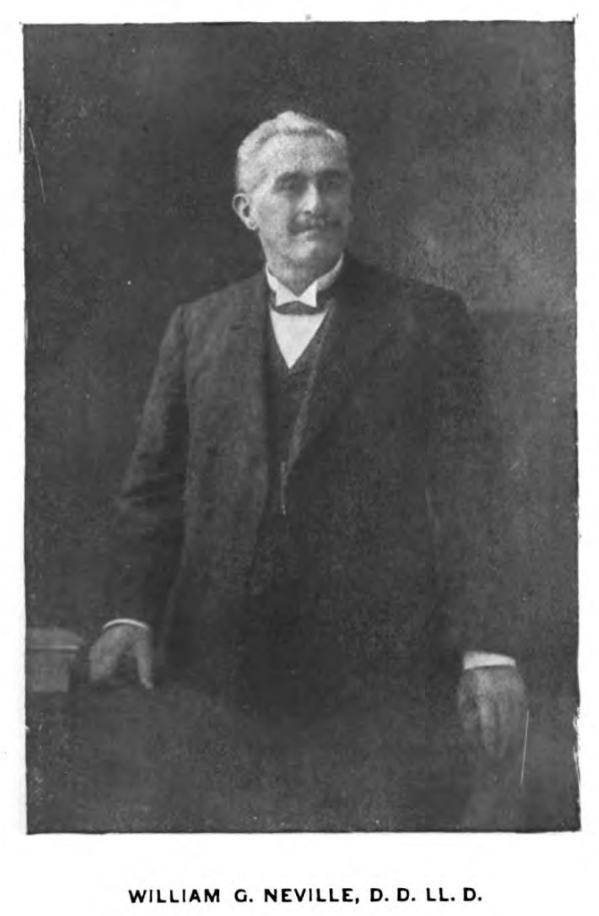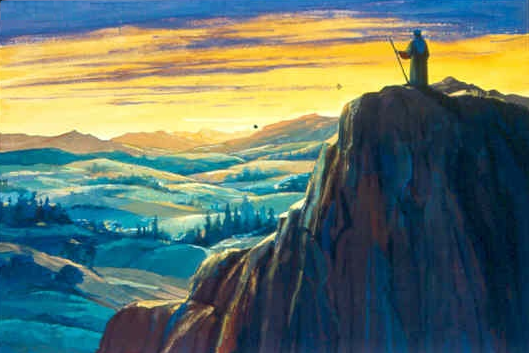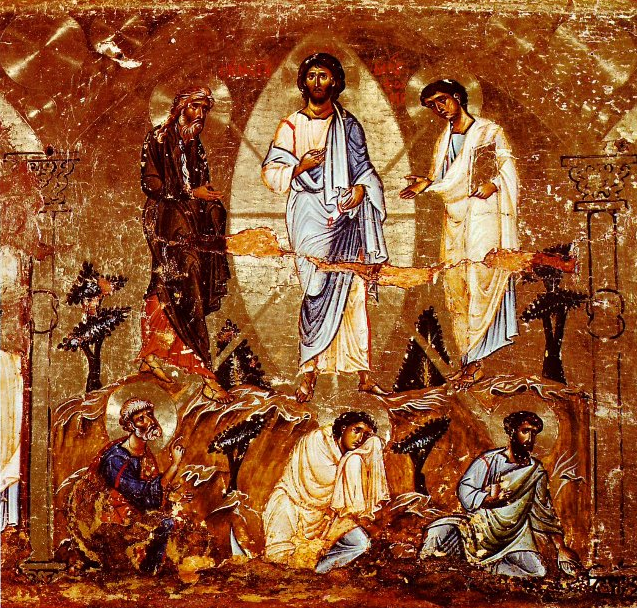
Editor’s note: The following is extracted from Sermons, by Rev. William G. Neville (published 1908).
“Thou shalt not go over thither.” — Deut. xxxiv. 4.
The Israelites had practically completed their long journey with its cares and its trials, its deprivations and its hardships, was behind them. They were now on the very threshold of the promised land; they were ready to cross over the river and take possession. How anxious they must have been, and how their hearts must have leaped with deep joy and exhilarating expectancy!
But every sweet in this world has its bitter; every joy has its sorrow. Moses, who had been the leader of this people, their teacher, their prophet, their lawgiver, their ruler — could not go over the river with them.
Here the people are, in the plains of Moab. God appears on the scene, and asks Moses to go up into the mountains of Nebo with him. They begin to ascend. They are soon lost to human view. At last, they reach Pisgah’s summit. Here, there is a magnificent view of the promised land. Here, the Lord showed the land to Moses. He sees its beauty and its grandeur. He sees its inexhaustible resources and its infinite possibilities. Here, in this small country, is an epitome of all countries — God’s gift to His own chosen people. As Moses viewed this land from Dan to Beersheba, from the river Jordan to the great sea, how his heart must have leaped for joy! He had been journeying, and toiling, and struggling for forty years to gain this prize. Now, he is standing on its very borders; now, he sees it with his own eyes. Oh, what an uplifting sight! What a blessed prospect!
But God says to Moses: “Thou shalt not go over thither.” Then we have a short, simple account of the death of Moses — all in one verse.
Then the record tells us that God himself buried Moses, and that no man knoweth of his sepulchre unto this day.
“And had he not high honor?
The hillside for a pall,
To lie in state, while angels wait,
With stars for tapers tall;
“And the dark rock-pines, like tossing plumes
Over his bier to wave,
And God’s own hand in that lonely land
To lay him in the grave.”
“Thou shalt not go over thither.”
But what a sad disappointment this must have been to Moses! There seemed to be just one step between him and complete success. Right on the verge of this full and triumphant consummation of his life-work, his earthly career is ended. His life on earth goes out be fore he places the cap-stone on his grand and noble work. “Thou shalt not go over thither.”
Why was he not permitted to enter the promised land? Because he transgressed against God at the waters of Meribah. God told him to speak to the rock; but he struck the rock with his staff. He had to suffer for this transgression. Even his prominence and purity of character and his great achievements in the past did not exempt him from the bad results of disobedience. By this striking incident in Moses’ life, God would hold up to all men everywhere a warning against disobedience. “Thou shalt not go over thither.”
Moses’ life seemed to be crowned with disappointment. His fond hopes were blasted. He died in full view of the promised land — in the very presence of victory — with the goal almost in his grasp. He did not attain that in this life for which the energies and efforts of a life-time had been expended.
I. Consider this remarkable experience from Moses’ point of view.
1. He was in robust health. Although he was one hundred and twenty years old, yet his physical strength was unabated; his mind was unimpaired; his eye was not dim; nor was his natural force abated.
If he had been weak in body and feeble in mind, it would not have been so sad. But here was Moses still in possession of his magnificent endowments and faculties, both physical and intellectual. He was still equal to a great work.
2. His work did not seem to be completed. He had not reached the end for which he had been striving. His great life-work was to carry the children of Israel from Egypt to the promised land. The people had not reached this land. Jordan was still between them and their destination.
Think, too, of the fact that these people were right on the threshold of the promised land. The time had come for the cap-stone to be laid on this noble and magnificent work of Moses. But Moses was not permitted to give the finishing touches to this grand and glorious work; nor was he permitted to witness these finishing strokes.
If men had been at the head of this enterprise, Moses would never have been separated from it just at this juncture. “If the story of Moses had been of man’s invention, we should have heard how Moses brought the Jews into the land of Canaan, and reigned over them, and died in great glory.”
But God orders it differently. By divine providence, Moses is separated from his work right on the eve of what seemed to be its glorious consummation. Just as the people were getting ready to sing the paeans of their victories and to celebrate the realization of their hopes, Moses disappears from human view. All alone with God, in the solitude of the mountains, he is led by the divine hand off the stage of activity and service in this world into the untried realities of the other world. Just as the fruit of the tree of his own planting and culture was getting ripe and ready to be plucked, he forever disappears and leaves this fruit to be gathered and enjoyed by others.
How sad, from a human point of view! “Moses drank very deeply of the bitter cup of disappointment. And it seems to have been his constant prayer that God would reverse or mitigate his sentence. ‘Let me go over, I pray thee, and see the good land that is beyond Jordan, that goodly mountain, and Lebanon.’ No poet could have painted that land with more glowing colors. He dipped his brush in rainbow tints as he spoke of that good land — that land of brooks and fountains and depths; that land of wheat and barley, of vines and pomegranates and figs; that land of oil, olives and honey. And no patriot ever yearned for fatherland as Moses to tread that blessed soil. With all the earnestness that he had used to plead for the people, he now pleaded for himself. But it was not to be. ‘The Lord was wroth, and said unto me. Let it suffice thee; speak no more unto me of this matter.’ The sin was forgiven; but its consequences were allowed to work out to their sorrowful issue. There are experiences with us all in which God forgives our sin, but takes vengeance on our inventions. We reap as we have sown. We suffer where we have sinned.”
As disappointment crowned the life-work of Moses, so we are frequently called upon, in the providence of God, to face and experience disappointment. We plan, we toil, we hope, but sometimes all of our purposes are brought to naught. We pass through the hardships of the wilderness, and just as we are about to emerge out of its barrenness and its monotony into the realization of our hopes, just as we are getting ready to cross over the Jordan and take possession of the promised land, God leads us through the mountains of Nebo to the summit of our Pisgah, and there, in the very ecstasy of delight, with the coveted goal right before us, where, from earth’s point of view, “every prospect pleases,” God tells us that we can’t go over. The burden is so heavy that it seems like it is bound to crush us.
II. But there is a divine side to this picture. Let us look at this side for a while. We must see this side before we can form a just estimate of the disappointments of life. There are two sides to the Christian’s disappointments — a dark side and a bright side.
Let us look at the bright side of Moses’ disappointment.
1. Moses saw the land. From Mount Pisgah, he viewed the promised land with his own eyes. God did not give Moses this revelation for the purpose of tantalizing him, but for the purpose of encouraging his heart.
Two things were revealed to him by this sight:
(1) The fact that the land was a good land. He had heard of its beauty, its wealth and its possibilities; but now he sees these things with his own eye.
(2) The fact that this land was soon to come into the actual possession of his people. This sight was an infallible prophecy that the people were to go over and possess the land. In some way, God assures Moses that the people would soon inherit this land. Moses had spent his life for these people. He had practically done everything that he could possibly do for them. Now, God shows him the victory. While he is not permitted to go over and take the land with the people, yet God shows him the glorious success which is soon to crown the noble efforts which he has put forth in behalf of the people. God assures Moses that his labors were not in vain.
So with our plans and hopes. They seem to come to naught; and, when we look at these things from earth’s point of view, we are cast down; but God comes to us and leads us up to the top of some Pisgah, and shows us the other side of this picture.
“Thy saints in all this glorious war
Shall conquer, though they die;
They see the triumph from afar,
By faith they bring it nigh.”
God gives us His blessed word, through which we can get a telescopic view of the future. When we look at our disappointments through the precious promises of God, we can see how God converts these things into real blessings to our souls.
“Sir Humphrey Davy said that his most important discoveries had been suggested by his failures, which he conquered.”
So it should be with us in the Christian life. Our very difficulties, when we have mastered them, become the means of achieving greater victories. Our very disappointments, when we see them from God’s point of view, become stepping stones in the divine life to higher attainments and greater victories. Our very weakness becomes an element of strength. Because, like Paul, when we are weak, then are we strong.
2. Again, Moses knew that a worthy successor had been appointed. The work could not suffer in the hands of Joshua. “Moses had laid his hands upon him.” Yes, and God himself had called, equipped and commissioned Joshua to be the successor of Moses. Joshua was to take the work up right where Moses laid it down. There was to be no break in the work. Men may die, men may prove unfaithful; but there is no contingency that can break the continuity in God’s plans and purposes as they are connected with the establishment of His kingdom in this world. Moses seemed to be a necessity to this great work. His death appeared to be an irretrievable calamity. But these things are only appearances. Moses was not a necessity. Moses dies, but God has a Joshua to take his place. God is not dependent on any man; nor on any set of men. His workmen die; but His work continues to live. David dies, but there is a Solomon to take his place. Elijah is carried to heaven in a chariot of fire, but God has an Elisha ready to take his place. The following inscription is on the Wesley Memorial in Westminster Abbey: “God buries the worker, but carries on the work.”
In preaching the sermon of Jabez Bunting, a distinguished English Wesleyan, the minister said: “When Jabez Bunting died, the sun of Methodism set.” A man in the audience shouted : “Glory be to God, that’s a lie.”
The work is above the workman. Let us ever keep this truth fresh in our minds and hearts.
We may be deeply anxious about the future of God’s kingdom and work in this world. Let us remember that God is at the head of affairs. He will steer the ship of Zion successfully over the rough seas of this life.
3. Again, it is better to die in the vigor of manhood and strength, while the work is prospering, than to waste away in weakness and let the work drag and suffer.
If Moses had continued at the head of this great work till he was dismissed by natural death, he probably would have been an injury to it. When a man is burdened with the infirmities of old age, he is sometimes an obstacle to the work. It is much better to die in harness, in the full vigor of a strong manhood, than to continue until we are altogether incapacitated by weakness and other infirmities.
It is better to give up and let others come in. God will take care of His own work. It is sad to see a man trying to accomplish that which is impossible. He be comes a burden to the work. It is better, infinitely better, to die, than to outlive our day. God knows when a man should leave the stage of action in this life. A man is immortal till his work is done. God’s great clock of time never strikes too soon, nor too late. And when that clock strikes, it is time for us to go. Moses was the man for the wilderness; but Joshua was the man for Canaan. When the Jordan was reached, God’s clock struck for Moses. It was God’s time for him to retire.
“Success is not the chief nobility of life. The chief blessedness of life is capability of service. It is a blessed thing to die when the work has been so far done that it justifies the worker, demonstrates his character, vindicates his nobleness; so that he is not ashamed to leave it for completion; so that his friends are proud of its unfinished fragments. The formal denial of our hopes may be the means of perfecting our characters.”
The work, in an important sense, is never finished in this life. There will always be something to do. It is our business to do our part of the work faithfully. Then God will take us to our reward and raise up others to carry on the work when we are gone.
4. Again, Moses had God. He was with God. Hence he was absolutely safe and should have been supremely happy. When he left the field of action here, he went away with God. He was wrapped up in the divine companionship.
When we contemplate his life and see how near he lived to God, how he delighted in God’s presence and rejoiced in God’s being, we can see how he could give up every human hope and prospect, and experience no permanent disappointment. God has his abiding place, for he could say, and did say, in the ninetieth Psalm: “Lord, thou hast been our dwelling place in all generations.” God was his strength, his hope, his portion and his all. God’s presence converted every disappointment into a real blessing. Moses saw the type of heaven in the promised land; but when God raised the veil and showed him the real heaven, no doubt his soul was filled with infinite rapture and delight. “Behind him, a long and glorious life; before, the ministry and worship of the heavenly sanctuary. Here, the Shekinah; there the unveiled face. Here, the tent and pilgrim march; there, the everlasting rest. Here, the promised land, beheld from afar, but not entered; there, the goodly land beyond Jordan entered and possessed. What though it was a wrench to pass away, with the crowning-stone not placed on the structure of his life; to depart and be with God was far better.”
When Moses saw the real heaven, he had no eyes for the earthly Canaan.
“There is a land of pure delight,
Where saints immortal reign;
Infinite day excludes the night,
And pleasures banish pain.
“There, everlasting spring abides,
And never with’ring flowers;
Death, like a narrow sea, divides
This heavenly land from ours.
“Could we but climb where Moses stood,
And view the landscape o’er,
Not Jordan’s stream, nor death’s cold flood,
Should fright us from the shore.”
Now, if we can just get into such close touch with God, if we can always feel the blessedness of His presence and the infinite consolation of His approval, then our hopes can and will be realized in Him. Disappointments may come, our hopes, from earth’s point of view, may never be realized; but, if we can say that we are God’s and that God is ours, then it will all be well with our souls.
“Jesus, to whom I fly,
Will all my wishes fill;
What though created streams are dry,
I have the fountain still.”











5